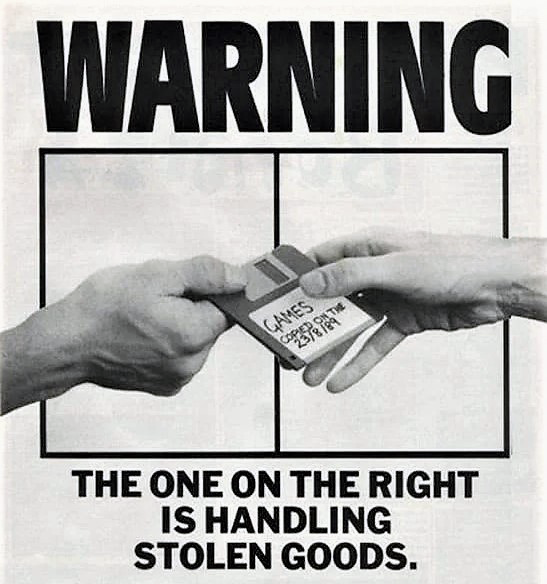Ever since the dawn of time, with money becoming the main medium which we use to access goods and services, getting things for free has always been the dream. Still that straw man argument of “stealing what you need” would apply to necessary goods, like food or clothing. In the case of videogames (or, well, movies and music) one would be hard pressed to recognize them as “necessary”. Still, in the 80s and 90s, sometimes it would take years for a game to reach the world, from Japan or the US. This meant that, in different cases, piracy would end up becoming a sort of necessary evil running parallel to “import games”, which would end up being a factor that would hurt companies in the console market. In the homecomputer market, piracy was often an endemic factor: you could fight it, but even if the market behaved efficiently, you could never win.
Let’s take a look at how software and gaming piracy in Europe through the 80s and 90s and which were the major players in the scene.
In the 80s the goverments’ stance against software piracy was pretty varied, there was no single European approach towards the topic. France and the United Kingdom, since the early 80s, were pretty outspoken against all kinds of illegal copying of floppies and games. But there were situations like Italy (probably the worst example, since a specific law only came in 1993), Spain and Portugal where that same approach took a while to become reality. Beyond each country’s own legal system, a topic which would definitely take several articles to analyze in detail, one important fact to note is how many of the Warez groups did hail from Europe.
The most active scene was surely the Scandinavian one, with many groups scattered around Sweden and Norway. Then, in order of importance, France and Germany and, finally, also Italy. Interestingly, the scene in Italy was not as big as others since piracy was a real legitimate industry, selling copied games in newspaper kiosks and shops. The original cracker scene was made up, mostly, of groups of young kids that were trying to build up their reputation, trying to find ways to access protected original games and distributing them to their friends. It was not about the money (as also Martin Paul Eve argues in “Warez”), but rather a sort of more sophisticated version of the good old “homecopying” methods, at least before the bulletin board systems (BBS) became a reality.

 genesistemple.com
genesistemple.com
Let’s take a look at how software and gaming piracy in Europe through the 80s and 90s and which were the major players in the scene.
From bedrooms to BBS: the pirates evolved
In the 80s the goverments’ stance against software piracy was pretty varied, there was no single European approach towards the topic. France and the United Kingdom, since the early 80s, were pretty outspoken against all kinds of illegal copying of floppies and games. But there were situations like Italy (probably the worst example, since a specific law only came in 1993), Spain and Portugal where that same approach took a while to become reality. Beyond each country’s own legal system, a topic which would definitely take several articles to analyze in detail, one important fact to note is how many of the Warez groups did hail from Europe.
The most active scene was surely the Scandinavian one, with many groups scattered around Sweden and Norway. Then, in order of importance, France and Germany and, finally, also Italy. Interestingly, the scene in Italy was not as big as others since piracy was a real legitimate industry, selling copied games in newspaper kiosks and shops. The original cracker scene was made up, mostly, of groups of young kids that were trying to build up their reputation, trying to find ways to access protected original games and distributing them to their friends. It was not about the money (as also Martin Paul Eve argues in “Warez”), but rather a sort of more sophisticated version of the good old “homecopying” methods, at least before the bulletin board systems (BBS) became a reality.

Gaming piracy in Europe between the 80s and 90s - a brief history
A short look at how gaming piracy in Europe evolved through the 80s and 90s, through histories of crackers and the Twilight CDs.
 genesistemple.com
genesistemple.com
